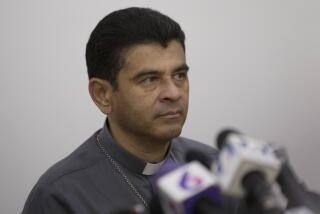Leaders to Discuss Church-State Conflict in Nicaragua
- Share via
MANAGUA, Nicaragua — For the first time in 18 months, President Daniel Ortega is scheduled to meet today with Cardinal Miguel Obando y Bravo and the rest of the Nicaraguan Bishops’ Conference to discuss the troubled relations between the Roman Catholic Church and the Sandinista government.
Church and diplomatic sources doubt that the talks will significantly ease the long-standing church-state conflict.
“This is one step in a long process,” said Father Eddy Montenegro, an aide to Obando, who is archbishop of Managua and primate of Nicaragua.
Tensions between the church and the regime soared this summer when the government refused to let Father Bismarck Carballo, the church’s main Nicaraguan spokesman, return to the country from a trip abroad and then expelled Bishop Pablo Antonio Vega, vice president of the bishops’ conference.
These moves against the church came soon after the House of Representatives voted in Washington to provide $100 million in aid to the contras, U.S.-backed rebels fighting the Sandinistas in the countryside. Carballo and Vega have both leveled harsh criticism at the Sandinistas, who, for their part, accused the two of campaigning outside the country against the government and of supporting the contras.
The church leadership has often accused the Sandinistas of being totalitarian and of persecuting religion. The bishops have pushed for negotiations between the government and the contras, and Obando is seen as the leading opposition figure inside the country.
Political Dispute
The Sandinistas and a movement of pro-government priests and laymen calling itself the “popular church” say that pastoral freedom exists here and that the church-state conflict is political, not religious. Three priests, now suspended from their priestly duties by the Vatican, hold high-level posts in the Sandinista government.
In what appeared to be a pre-condition for today’s talks, both sides were secretive about the time and place for the meeting and refused official comment.
Church sources said privately, however, that there is no agenda for the meeting and that each side will propose a list of problems for discussion. They described a preliminary meeting to arrange the talks as “very tense.”
The sources said that church priorities would be the return to Nicaragua of Vega and Carballo and resumption of broadcasting on Radio Catolica, the church’s station, which was closed by the government in January.
Government sources said the regime wants the church to clarify its position on the U.S.-backed contras war and to agree to hold further meetings.
“President Ortega clearly is not asking the bishops to toe the government line, but what is unacceptable is that they toe the U.S.-government line,” a source familiar with church-state relations said.
Ortega and Obando are expected to open the talks with a one-on-one session and to be joined later by the other eight Nicaraguan bishops, some government ministers and the papal envoy here.
Ortega and Obando met last in April, 1985.
Ortega’s Proposal
During a visit to the United States last month, Ortega announced an eight-point peace proposal calling for talks with the Vatican on church-state issues and a meeting with the bishops.
Church and government sources said that Ortega asked the new papal envoy, Bishop Paolo Giglio, to arrange the dialogue when Giglio presented his credentials last month.
Skeptical diplomatic and church sources said the talks are a propaganda ploy on the part of the Sandinistas to calm the international furor over Vega’s expulsion.
“Experience has taught us that the dialogue always comes after a difficult moment in relations with the state and a strong campaign against us,” one church leader said.
Some in the government speculate that the Nicaraguan church hierarchy is willing to talk now because of pressure from the Vatican, which they say fears that the current divisions within the Nicaraguan church could lead to a permanent rupture.
In an apparent conciliatory gesture, the government reversed its decision to bar a U.S. priest from returning to Nicaragua where he had worked for 12 years.
Father Everett Brown was prevented from returning to Nicaragua on Sept. 7 but was allowed back into the country a week later.
More to Read
Sign up for Essential California
The most important California stories and recommendations in your inbox every morning.
You may occasionally receive promotional content from the Los Angeles Times.













